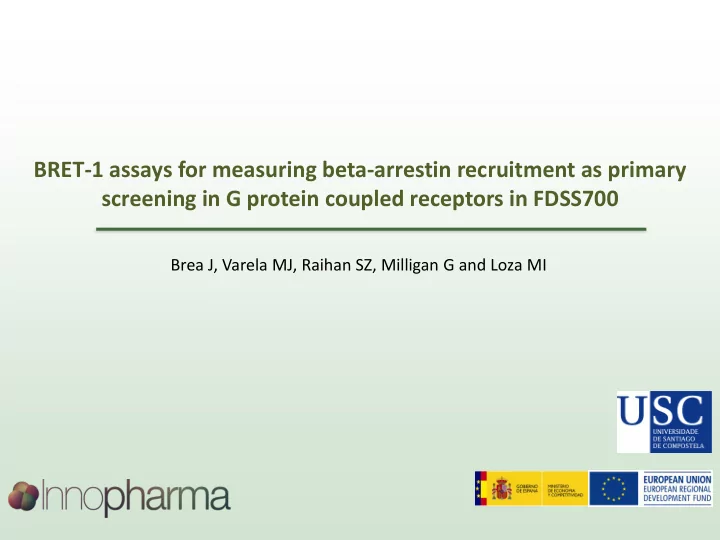

BRET-1 assays for measuring beta-arrestin recruitment as primary screening in G protein coupled receptors in FDSS700 Brea J, Varela MJ, Raihan SZ, Milligan G and Loza MI
Outline • What is Innopharma • GPR120 (FFA4) • BRET1 screening using FDSS7000 • Summary
Who we are Pharmacogenomic Platform Devoted to Knowledge valorisation • Reference groups with over 15 • Our fundraising average • Over 30 Spanish and years experience in genomic is 2,5 million € /year. international medicine and drug discovery. pharmaceutical and Located at the Research Centre biotechnology companies . on Molecular Medicine and Chronic Diseases (CIMUS) of • We have a self-funded • International research the University of Santiago de and validated platform groups and scientific Compostela (USC). business model. networks at the highest level. • Managing a multidisciplinary team of 130 professionals. • Connected with the best experts in the world on • Consolidated knowledge- strategic issues. based platform Validated Experience Collaborations model Surpassing the traditional financial, technical and execution risks associated to Academia
Objectives Open innovation and internationalization applied to a pipeline of new drug discovery programs. Add value to programs devoted to early drug discovery to bridge the gap between basic research in new therapeutic mechanisms and its industrial application . Provide know how and technological support infrastructure to boost the creation of new knowledge-based companies. Propose a sustainability plan based on open innovation collaborative models.
Programs Pipeline. Call for proposals In its first call for research projects, INNOPHARMA has received 110 EoI, of which 8- 10 were initially selected for further development. Selected projects were classified in the following categories according to their stage of development in the process of early drug discovery: • go/no go milestones • initial stage of development • open innovation • high scientific value but high risk Open-lab projects • academic approach by and for the industry • complementarity with companies Hit-to-candidate projects Fit into INNOPHARMA capabilities Preclinical stage projects Advanced stage of development
GPR120 (FFA4) Prof Graeme Milligan GPR120 (FFAR4): long chain fatty acid receptor. Highly expressed in a range of tissues including lung, colon, adipose, brain, taste buds, skeletal muscle, heart and liver.
GPR120 Humans: GPR120 expression in adipose tissue is significantly higher in obese individuals than in lean controls. Human genetic study in European populations identified a loss-of-function GPR120 mutation (p.R270H) associated with obesity and insulin resistance. GPR120, the sensing receptor for long-chain free fatty acids, represents a novel drug target for the treatment of obesity and diabetes.
GPR120 (FFA4)
GPR120 (FFA4) GPR120 activation: • promotes angiogenesis in vitro and in vivo • enhances motility of CRC cells • Induces EMT GPR120 functions as tumor-promoting receptor in CRC We looked for antagonists of GPR120 as putative anticancer drugs
GPR120 (FFA4) Post deorphanization of GPR120 a number of natural and synthetic ligands have been described, but further ligands with higher potency and selectivity would be valuable.
GPR120 (FFA4) Prof Milligan’s group at the University of Glasgow developed a cell line constitutively expressing β -arrestin 2- Renilla luciferase and able to inducibly express GPR120-eYFP
BRET1 Screening using FDSS7000
BRET1 Screening using FDSS7000 4880 cpds representative of the chemical diversity of the whole Innopharma library were screened. FDSS7000 equipped with two 384 heads and two tip racks and automated filter exchanger for measuring BRET1 was employed. • Flp-In TM T-REx TM 293 cells stably expressing β - arrestin 2 were seeded onto 384-well plates coated with poly-D-lysine and treated with 100 ng/ml doxycycline to induce FFA4 expression. • After 24 h cells were washed twice with Hank´s balanced salt solution, pH 7.4. • Test compounds or antagonist TUG1275 at a final concentration 10 μM were added and plate put into FDSS7000 and incubated for 5 min at 37 °C. • Coelenterazine h was added by FDSS 7000 to a final concentration of 5 μM and cells were incubated for 10 min at 37 °C. • 10 μM agonist (TUG891) was added by FDSS7000 and luminiscence detected for 10 min.
BRET1 Screening using FDSS7000 Coelenterazine addition Agonist addition
BRET1 Screening using FDSS7000
BRET1 Screening using FDSS7000
BRET1 Screening using FDSS7000 1.0 0.9 0.8 Z' factor value 0.7 0.6 0.5 0.4 0.3 0.2 0.1 0.0 0 5 10 15 20 Plate 23 hits were confirmed in an independent assay (hit confirmation rate = 72%)
BRET1 Screening using FDSS7000 Concentration-response curves revealed a non-reversible antagonism for some compounds Further assays are now running with the compounds included in the same cluster of those representative compounds
Summary • A BRET1 assay was developed by using a expressing β -arrestin2-Rluc and doxycline-induction of GPR120 . • A subset of 4880 representative compounds from the Innopharma chemical library was screened by using this methodology. • Z’ values were higher than 0.5 in all the plates screened. • 23 hits were identified (hit rate= 0.47%; hit confirmation rate=72%). • Concentration-response curves revealed a non-reversible antagonism of the hits identified.
Acknowledgements Prof Graeme Milligan David Castrillo Jean Marc Dangelo Cyril Guerinot Thibault Poissinger
Recommend
More recommend